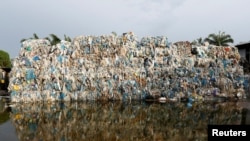Wealthy countries are exporting millions of tons of plastic waste to Southeast Asia where the recycling systems are becoming overwhelmed, leading to widespread pollution problems, according to a joint investigation by Greenpeace and the Global Alliance for Incinerator Alternatives (GAIA).
In early 2018, China banned the import of plastic waste for recycling, sending the global trade into turmoil.
Greenpeace and GAIA investigators collated data from the top 21 importers and exporters of plastic waste before and after the Chinese ban. They found that over half of the plastic that had been destined for China — more than 3 million tons annually — is now being diverted to Southeast Asia.
Thailand, Malaysia and Vietnam are among the countries where mountains of plastic waste are piling up.
"They do not have enough capacities for handling such a large amount of imported foreign waste, so there is some pollution to the local environment," Kate Lin of Greenpeace told VOA.
Near the village of Jenjarom, located 50 kilometers outside Kuala Lumpur, huge piles of plastic waste lie abandoned in the middle of a palm oil plantation. The labels on the bottles, cartons and plastic bags give away their source — much of it has traveled thousands of kilometers from rich economies in Europe and North America.
Residents are suffering the consequences, said local environmentalist Pua Lay Peng.
"They just dump the non-recyclable plastic or the rejected product, then they burn [it] in the backyard of this factory. So, those toxic fumes actually already caused a lot of health problems to our residents," she said.
Lin said wealthy countries are simply exporting their waste problems.
"They have good collection facilities, but actually they are sending half of their collected waste to other countries. Before the China ban, they just sent it to China for recycling, but they do not take the further step to ensure those recyclables are properly recycled. And now after the China waste ban, they just try other new places to send their recyclables to," she said.
Many Southeast Asian countries are beginning to impose their own restrictions on plastic waste imports, forcing the trash into less regulated markets such as Indonesia and India.
At a United Nations conference in Geneva this week, 180 countries are discussing a proposal to force plastic waste exporters to receive permission from destination countries in advance, a system known as "prior informed consent," already used for more hazardous waste.
For those dealing with the impact, the changes can't come soon enough, said Pua.
"We are killing ourselves by using too many plastic. We are too dependent on plastic. Please manage and handle your own trash. Don't dump to our country."
Greenpeace said the ultimate solution does not lie in improving recycling but in cutting back drastically on plastic production and consumption worldwide.






